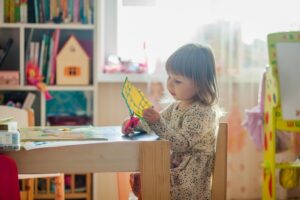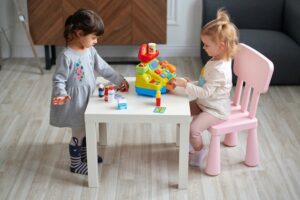Kindergarten education is a crucial foundation for a child’s academic and personal development. It serves as an introduction to formal education and plays a significant role in shaping a child’s learning trajectory. In this article, we will explore why kindergarten education is important for children and the long-lasting benefits it provides.
Kindergarten provides a structured environment where children learn important social and emotional skills. They learn to interact with peers, share, take turns, and cooperate with others. Through play-based activities and group projects, children develop essential social skills such as communication, problem-solving, and empathy. Kindergarten fosters a sense of community and belonging, helping children build relationships and develop positive self-esteem. Kindergarten acts as a bridge between the home environment and formal schooling. It prepares children for the academic challenges they will encounter in subsequent grades. In kindergarten near me, children are introduced to foundational skills such as reading, writing, and numeracy. They learn letters, sounds, basic math concepts, and develop early literacy and numeracy skills. These early academic experiences lay the groundwork for future learning, setting children on a path towards academic success.

Kindergarten provides a rich language environment where children are exposed to vocabulary, storytelling, and communication opportunities. They engage in conversations, listen to stories, and express their thoughts and ideas. Through language-rich activities, children develop strong oral language skills, which are essential for effective communication and future academic achievements. Kindergarten also lays the foundation for early reading skills, helping children develop phonemic awareness and a love for books and literacy.Kindergarten promotes cognitive development by stimulating critical thinking, problem-solving, and creativity. Children engage in hands-on activities, explore their environment, and learn to think independently. Kindergarten encourages curiosity, exploration, and discovery, fostering a love for learning. Through puzzles, games, and open-ended tasks, children develop cognitive skills such as logical reasoning, spatial awareness, and memory, which are crucial for their overall cognitive development.

Kindergarten provides opportunities for children to enhance their fine and gross motor skills. Activities such as drawing, painting, cutting, and playing with manipulative materials improve hand-eye coordination, dexterity, and muscle control. Outdoor play and physical education activities develop gross motor skills, balance, and coordination. Kindergarten recognizes the importance of physical development and provides a structured environment for children to refine their motor skills.Kindergarten encourages independence and self-confidence in children. As they navigate daily routines, follow instructions and complete tasks, children develop a sense of autonomy and responsibility. They learn to manage their belongings, make choices, and solve simple problems. Kindergarten provides a nurturing environment that supports children’s growth as they gain confidence in their abilities, boosting their self-esteem and fostering a positive attitude towards learning.
Kindergarten is a diverse and inclusive environment where children learn about different cultures, traditions, and perspectives. They are exposed to a range of experiences, stories, and celebrations that promote cultural understanding and respect. Kindergarten cultivates an appreciation for diversity, helping children develop a sense of global citizenship. This early exposure lays the foundation for tolerance, inclusivity, and empathy, essential qualities for thriving in a multicultural society.
